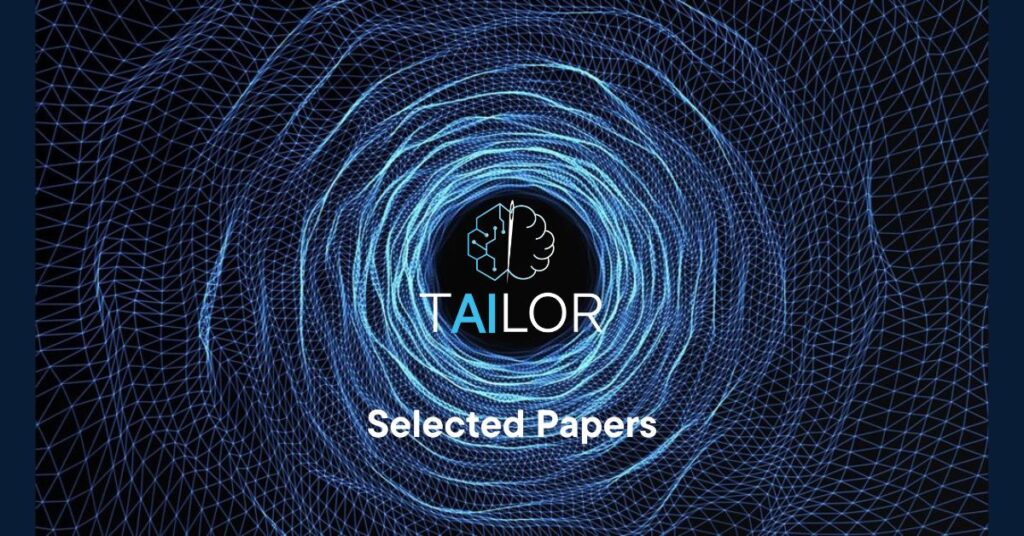Every month, we want to acknowledge some valuable TAILOR papers, selected among the papers published by scientists belonging to our network by TAILOR principal investigator Fredrik Heintz. The list of the most valuable papers gathers contributions from different TAILOR partners, each providing valuable insights on different topics related to TrustworthyAI.
This is the very last selection of TAILOR papers we will publish, since the project ended in August 2024.
A Survey on Stability of Learning with Limited Labelled Data and its Sensitivity to the Effects of Randomness
B. Pecher, I. Srba, and M. Bielikova
ACM Computing Surveys, vol. 57, no. 1, 2024, doi: 10.1145/3691339.
Abstract: Learning with limited labelled data, such as prompting, in-context learning, fine-tuning, meta-learning, or few-shot learning, aims to effectively train a model using only a small amount of labelled samples. However, these approaches have been observed to be excessively sensitive to the effects of uncontrolled randomness caused by non-determinism in the training process. The randomness negatively affects the stability of the models, leading to large variances in results across training runs. When such sensitivity is disregarded, it can unintentionally, but unfortunately also intentionally, create an imaginary perception of research progress. Recently, this area started to attract research attention and the number of relevant studies is continuously growing. In this survey, we provide a comprehensive overview of 415 papers addressing the effects of randomness on the stability of learning with limited labelled data. We distinguish between four main tasks addressed in the papers (investigate/evaluate, determine, mitigate, benchmark/compare/report randomness effects), providing findings for each one. Furthermore, we identify and discuss seven challenges and open problems together with possible directions to facilitate further research. The ultimate goal of this survey is to emphasise the importance of this growing research area, which so far has not received an appropriate level of attention, and reveal impactful directions for future research.
Learning differentiable logic programs for abstract visual reasoning
H. Shindo, V. Pfanschilling, D. S. Dhami, and K. Kersting
Machine Learning, 2024, doi: 10.1007/s10994-024-06610-2.
Abstract: Visual reasoning is essential for building intelligent agents that understand the world and perform problem-solving beyond perception. Differentiable forward reasoning has been developed to integrate reasoning with gradient-based machine learning paradigms. However, due to the memory intensity, most existing approaches do not bring the best of the expressivity of first-order logic, excluding a crucial ability to solve abstract visual reasoning, where agents need to perform reasoning by using analogies on abstract concepts in different scenarios. To overcome this problem, we propose NEUro-symbolic Message-pAssiNg reasoNer (NEUMANN), which is a graph-based differentiable forward reasoner, passing messages in a memory-efficient manner and handling structured programs with functors. Moreover, we propose a computationally-efficient structure learning algorithm to perform explanatory program induction on complex visual scenes. To evaluate, in addition to conventional visual reasoning tasks, we propose a new task, visual reasoning behind-the-scenes, where agents need to learn abstract programs and then answer queries by imagining scenes that are not observed. We empirically demonstrate that NEUMANN solves visual reasoning tasks efficiently, outperforming neural, symbolic, and neuro-symbolic baselines.
Lifted action models learning from partial traces
L. Lamanna, L. Serafini, A. Saetti, A. E. Gerevini, and P. Traverso
Artificial Intelligence, vol. 339, 2025, doi: 10.1016/j.artint.2024.104256.
Abstract: For applying symbolic planning, there is the necessity of providing the specification of a symbolic action model, which is usually manually specified by a domain expert. However, such an encoding may be faulty due to either human errors or lack of domain knowledge. Therefore, learning the symbolic action model in an automated way has been widely adopted as an alternative to its manual specification. In this paper, we focus on the problem of learning action models offline, from an input set of partially observable plan traces. In particular, we propose an approach to: (i) augment the observability of a given plan trace by applying predefined logical rules; (ii) learn the preconditions and effects of each action in a plan trace from partial observations before and after the action execution. We formally prove that our approach learns action models with fundamental theoretical properties, not provided by other methods. We experimentally show that our approach outperforms a state-of-the-art method on a large set of existing benchmark domains. Furthermore, we compare the effectiveness of the learned action models for solving planning problems and show that the action models learned by our approach are much more effective w.r.t. a state-of-the-art method.
